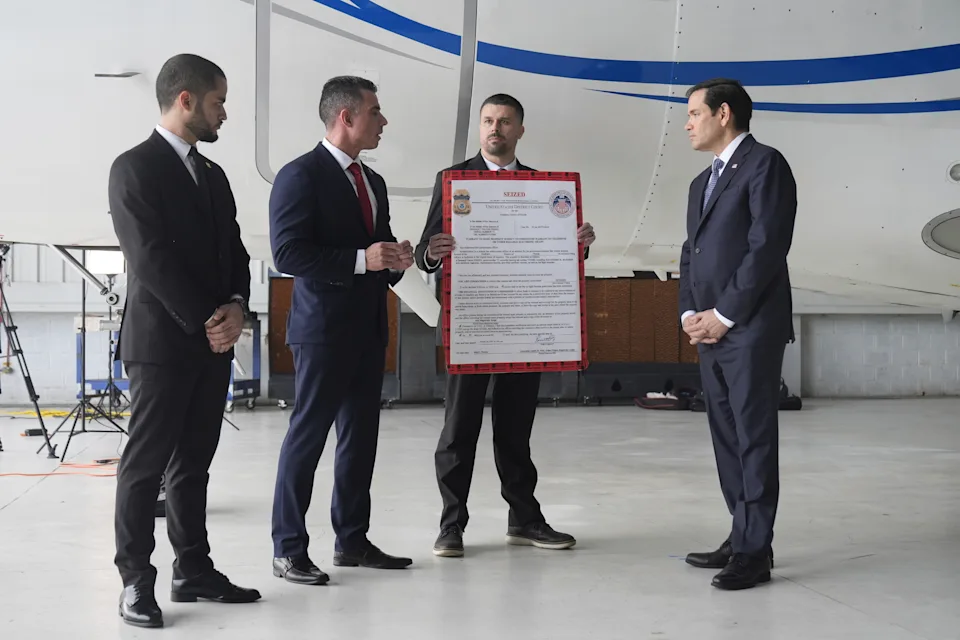
A covert U.S. operation aimed at capturing Venezuelan President Nicolas Maduro reportedly involved efforts to recruit his personal pilot, Gen. Bitner Villegas, to betray him and deliver him into U.S. custody. The operation, revealed in a recent Associated Press investigation, sheds light on the Trump administration’s intensifying campaign to pressure Maduro over drug trafficking and narco-terrorism charges.
According to interviews with current and former U.S. officials, as well as opposition figures, the plot had all the elements of a spy thriller: luxury jets, secret airport meetings, high-stakes diplomacy, and the delicate wooing of a key Maduro ally. The AP also reviewed authenticated encrypted messages between U.S. Homeland Security Investigations (HSI) agent Edwin Lopez and the pilot.
The Recruitment Attempt
Lopez, serving as an HSI attaché in the Dominican Republic, identified a window of opportunity when two Venezuelan government jets, frequently used by Maduro for international travel, landed in the Caribbean for repairs. Recognizing the strategic importance of the aircraft and the pilots, Lopez obtained permission to approach members of the Venezuelan Air Force, ultimately making contact with Bitner Villegas.
In May 2024, at an executive airport in Santo Domingo, Lopez proposed a high-stakes arrangement: if Villegas diverted Maduro’s plane to a location where U.S. authorities could capture him, the pilot would gain wealth and public recognition across Venezuela. Locations suggested for the operation included the Dominican Republic, Puerto Rico, or Guantanamo Bay, Cuba.
Villegas, a member of the elite presidential honor guard, remained noncommittal but exchanged phone contacts with Lopez. Over the following months, Lopez continued his outreach through encrypted messages, highlighting the $50 million U.S. bounty for Maduro’s capture and appealing to Villegas to “be on the right side of history.”
Broader U.S. Efforts to Oust Maduro
The operation is part of a larger U.S. strategy to topple Maduro’s regime, which Washington blames for eroding democracy and providing safe haven to drug traffickers and hostile actors in the region. Since Trump’s return to office, U.S. forces have intensified operations in the Caribbean, deploying naval strike forces, attack helicopters, and troops to target suspected drug trafficking networks originating from Venezuela.
The Trump administration has also authorized covert CIA operations inside Venezuela and doubled the bounty for Maduro’s arrest to $50 million. U.S. military strikes over the past year have reportedly killed at least 43 individuals involved in illicit activities.
Fallout After Pilot Rebuff
After Villegas declined to cooperate, opposition figures and U.S.-aligned operatives attempted to sow doubt about his loyalty within Venezuela. Former national security official Marshall Billingslea staged a public campaign, posting images on social media juxtaposing Villegas at the Dominican airport with an official Venezuelan Air Force portrait. The post, timed to coincide with Maduro’s flights, triggered speculation about Villegas’ status and loyalty.
The pilot disappeared from public view for several days, causing further conjecture, before resurfacing on Venezuelan state television, appearing alongside Interior Minister Diosdado Cabello. During the broadcast, Cabello mocked any suggestion of disloyalty, while Villegas silently raised a fist in a display of steadfast allegiance to Maduro.
Implications for Venezuela and U.S. Policy
The episode illustrates the high-risk, clandestine measures the U.S. has employed to undermine Maduro’s regime, highlighting both the challenges and limitations of covert influence operations. It also underscores the delicate position of military personnel within authoritarian regimes, where loyalty and personal risk intersect in high-stakes political maneuvering.


Leave a Reply